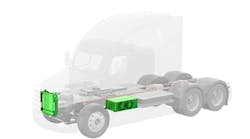What cold weather means for CEV batteries
While electric vehicles don’t have many of the systems that cause cold weather problems in diesel-powered trucks, issues still exist. For Gina Bonini, VP and GM of Advanced Thermal Systems at Modine, however, that means seasonal temperature-related preparations for EVs will look different.
“Cold weather is known to impact EV battery range and performance, but it is important to know that nearly two-thirds of the range reduction is due to the extra drain on the battery to heat the cab for driver comfort,” Bonini said. “Cold temperatures also impact performance as the battery will deplete a charge faster and take longer to recharge.
“EV batteries are susceptible to temperature swings and must be maintained in a much narrower operating temperature window than ICE vehicles,” Bonini continued. “In addition to the battery, managing temperature is important for the inverter, converter, and traction motor. Appropriate thermal management is necessary for efficient EV operation all winter long.
See also: Preparation pays: Winterizing best practices
“A commercial EV battery thermal management system (BTMS) helps maintain the battery pack at its ideal temperature, regardless of harsh outdoor temperatures,” Bonini explained. Additionally, planning for winter months can help optimize efficiency and uptime and extend the battery’s life.
“For example, especially during extreme temperatures, a BTMS can maintain battery temperature by heating the coolant that circulates the pack. A BTMS also has the capability to pre-condition an EV by warming up the battery packs to an optimal temperature range before the vehicle is charged or driven.
“While winterizing is not as hands-on for EVs as it is for ICE vehicles, fleets should pay attention to the diagnostic and maintenance software for battery thermal management systems,” Bonini said. “Those systems also have tools to help ensure necessary preventive maintenance is done to keep vehicles running smoothly.”




